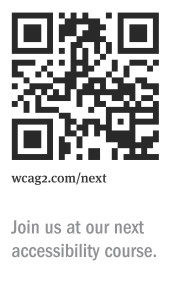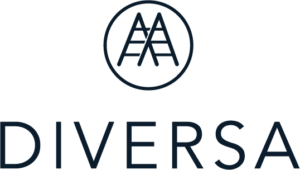eAccessibility with David Berman: Office, InDesign, PDF, Web for the new legislation (including WCAG 2.1!)
Easy steps for including your entire audience.
Major sponsors:
![]()
Online*
This course is hosted online
![]()
June 13, 2019
12:30 – 16:30 ET (North American Eastern Time)
*Joining us online? Your remote participation is live on your computer or tablet, with a moderator assigned to you who is in the room. You hear and see us, and we hear but don’t see you.
“Best webinar/training session I have participated in. David was fantastic, easy-going, passionate, friendly, and an expert.”
– Mary Foley, US Department of Agriculture
“The most effective accessibility course I’ve ever attended.”
– Francine Garneau, City of Ottawa
“David used real-life examples, got people up and interacting. It was an amazing experience.”
– Andrew Davies, Shaw Media
“The presenter was very engaging. This format is hard to do and he did a great job!”
– Karla Stroud, Blackboard
Not sure if you can join us? No worries: here a sample lesson from last time
Five reasons why we should care about accessibility
Transcript | Five reasons why we should care about accessibilityThis is a transcript of the video Five reasons why we should care about accessibility
(TEXT ON SCREEN: Five reasons why we should care about accessibility – Lesson excerpt from eAccessibility with David Berman)
(David Berman appears on screen and faces the camera for the duration of this video. David is wearing a dark grey suit with a black shirt and tie. Also on the screen are slides he is speaking to: David audio describes all relevant slide content as he goes.)
What I want to bring you to is five reasons why we need to care about accessibility. And the first one is, there’s just so many of us on the planet today. I’m showing a picture of Times Square, New Year’s Eve. There’s perhaps over a hundred thousand people packed in there.
And I’m going to start a poll. I’m going to show you how the polls work. So I’m going to launch a poll. And I’m going to ask you the question– and I’m asking it now out loud as well as in writing. What proportion of people do you figure regularly experience a substantial disability? And the way the poll works is I launch the poll. And those of you that can see the screen c see that there’s five choices– 6%, 9%, 15%, 18%, or 100%. I’m asking you to tell me what proportion of people you think regularly experience a substantial disability. And you can use the poll tool. Or you can use your voice to announce your result, and we’ll log it in as well for you.
I’m just going to leave that poll in as I’m watching over 70% of us have voted already. All right, it looks like almost everyone has now voted. We’re over 80%. I’ll just leave it open a few more moments. And I’m going to close the poll now.
And here’s our results. So what do we got? Well, so the majority of us chose the fourth of the five answers, 18%. So the majority of us are thinking 18% of people live with a substantial disability. And you’re kind of right.
I think it’s 100%. We’ll see why that is soon enough. But whether it’s 18% or it’s 100%, I think we get it.
And so if we look at the 18%– and how many people are living on the planet these days? I’m going it’s say 7 billion people, of which 18%– so it’s 18%, 7 billion. That’s about a fifth. That’s about 1.2 billion people who aren’t buying our products or aren’t getting our message about health care or whatever reason. That’s a lot of people to leave out. And of course, if we’re into publishing on the web, we want to reach everyone.
Now, the second reason to care about accessibility is search. Statistics show us that, at least in Canada and the United States, over 70% of retail purchases begin with an online search. And Google search engine, the AI engine is getting smarter and smarter, but still, perhaps, has the cognitive ability of perhaps a four-year-old. And because of that, if we follow accessibility principles to structure our information away that Google’s confident that it understands the relative importance of information, and it’s confident that you’re presenting information that is credible, then it increases the chance that your results are the ones that are going to be presented, and that your results are going to be presented at the right time to the right people. And everyone wants that. For many organizations we work with, search alone was worth the investment in creating an accessible product.
The third reason– and I’m showing a picture right now of Stephen Hawking as an example of the importance, from a human resources perspective, that if we want to attract and retain the very best people, there’s not an HR department on the planet that wants to eliminate 18% of the potential people to help make their organization succeed right off the bat because you can’t work there. And indeed, part of our process with creating accessible products isn’t just to make sure that the output, the end product is accessible, we actually want to create products in a way that everyone can be involved in every step of the process of creating the product, whether it’s the content management system authoring in a website, or if we’re creating a document that, even while the document is still in Word or PowerPoint, we want an accessible experience and not just wait for the final publishing of the website or the publishing of, let’s say, a result in PDF or an EPUB file.
The fourth reason is the social justice reason. It’s just the love– I’m showing a picture of someone who looks shockingly like me hugging a tiger. And well, it’s just the right thing to do. Here in Canada, we may not be the most glamorous country on the planet. But a lot of people do give us kudos for often demonstrating how we can create a civilization that doesn’t leave folk behind.
But the fifth reason, the fifth reason is the regulatory reason. And whether it’s federal regulations, or provincial or state regulations, or– we’re all federations here. Hey, Canada, US, it’s true. We’re all federations. All right. So we can talk federal. OK, so at the federal level, a lot of you, I know, are here because you’re it’s being demanded of you that in order to comply to meet or exceed what the government is now demanding that you need to know how to do these things.
(TEXT ON SCREEN: David Berman Communications)
About the course
David Berman will convince you why universal design helps everybody; to comply with new laws (including the refreshed Section 508, the upcoming Accessible Canada Act, and the next deadlines for AODA), to broaden your audience, to drive down costs, and to fulfill our social responsibility and inclusion commitments. He will provide in-depth familiarity with W3C WCAG success criteria (including the new WCAG 2.1), as well as ADA, Section 508, and AODA requirements.
Knowing how to follow the guidelines will result in your documents and webpages being more effective resources for your entire audience… including your most frequent visitor: Google. You’ll also gain familiarity with the assistive technologies that help people with specific disabilities and difficulties.
Not only will you leave with ideas you can use right away, you may also gain a whole new attitude towards how technology can improve lives. By the end of the event you will not only be aware of why accessibility and standards affect everyone: you’ll be equipped with an understanding of what you need to do, and how to do it best.
Our courses and learning guides combine to contain everything you need to know in order to pass the IAAP CPACC and WAS certification examinations.
The course platform is GoToWebinar, configured to work for everyone including all federal departments (test room available).
Agenda
- Why should we care?
- What are the challenges people face?
- What assistive technologies close the gaps?
- Laws and regulations
- ADA: Americans with Disabilities Act
- Revised Section 508
- EU Mandate 376 | EN 301 549
- Accessible Canada Act
- AODA: Accessibility for Ontarians with Disabilities Act
- Accessibility for Manitobans Act
- Standard on Web Accessibility
- Legislations from other countries and jurisdictions
- What are the technical standards? Demystifying the acronyms…
- WCAG 2.0 and 2.1: the Web Content Accessibility Guidelines
- What’s new in WCAG 2.1?
- What you need to know about the WCAG 2.0 and 2.1 success criteria
- PDF/UA: the accessibility standard for PDF
- How do professionals in your industry comply with every success criteria, without tradeoffs?
- Quality assurance and testing
- What are the best testing tools to confirm you’re meeting the standards?
- Exceeding the standards: functional accessibility
- Level AAA, email, social media, etc.
- Q&A (David stays until you run out of questions!)
For whom will this course be useful?
- Document authors
- Presentation authors
- Social media promoters
- Creators
- Influencers
- Writers and editors
- Translators
- Graphic designers
- Web designers
- UX/Interaction designers
- Document designers
- Instructional designers
- Software developers
- SEO analysts
- Managers
Pricing
| What you get | Regular ticket | Economy ticket |
|---|---|---|
| Price | $330 CAD ($260 USD)** (less if you take the Early Bird discount!*) |
$249 CAD ($198 USD)** |
| Half-day seat | ✔ | ✔ |
| 160+ page learning e-guide | ✔ | ✔ |
| Guaranteed-to-run | ✔ | ✔ |
| Any recording that may be produced *** | ✔ | |
| Course certificate shipped to you | ✔ | – |
| Free cancellation option | ✔ | – |
| Free one-on-one telecoaching post-course | ✔ | – |
| Busy bee option **** | ✔ | – |
Groups: Any group of 4 or more people who work together can contact us for a coupon code for 20% off regular class tickets (Want to save even more? Have your organization become a supporting sponsor!).
*CAD$40 discount on regular class ticket for Early Bird registration (at least 28 days before course, cannot be combined with other discounts or promotions).
**Charges are transacted in Canadian dollars: if you pay in US dollars the conversion is at Google’s rate on that day.
***For an economy ticket, you have a choice of either attending or receiving the recording (with a full ticket you get both).
**** Busy bee option lets you attend any portion of the course you’d like, and then continue or repeat at a future giving of the same course. It also gives you access to any recording we make of the course.
Register For June 13, 2019 – Online
“Makes you feel you are part of the course.”
– Arup Ghosh, BMO Financial Group
“What I think you have done for me is given me a different way of looking at accessibility. Which, I think is incredibly valuable.”
– Jennifer Cowan, Accessibility Coordinator, County of Elgin
“Great mix of humour and knowledge.”
– Joy Moskovic, Treasury Board of Canada Secretariat
About David Berman
Expert Speaker on Web Accessibility
David Berman is one of fewer than 100 people globally to hold CPACC certification, the World’s only certification for accessibility professionals. (In fact, he was the first person in Canada to take the exam!) This certification is issued by the US-based IAAP (International Association of Accessibility Professionals). IAAP is a division of G3ICT, for which David is an International Advisor.
David has over 30 years of experience in design and communications, and has worked extensively in the adaptation of content for electronic distribution, including accessible Web and software interface development.
He was contracted by Sir Tim Berners-Lee’s World Wide Web Foundation to audit online accessibility in over 40 countries for the annual theWebIndex.org benchmark report.
As author (Do Good Design [Peachpit/Pearson, 2009/2013]), expert speaker, designer, communications strategist, and accessibility consultant, his professional work has brought him to over 30 countries.
In 2009, David was appointed a high-level advisor to the United Nations on how accessible Web design can help fulfill the Millennium Development Goals.
In 2015, he was named an Invited Expert to W3C, the authors of WCAG 2.0. The same year he was appointed International Universal Design Champion for the Government of Ireland.
David is a member of the ISO committee for accessible PDF (PDF/UA), and an International Advisor for G3ICT.
He regularly teaches WCAG accessibility as part of his professional development workshops. His work includes award-winning projects for the City of Ottawa, the Ontario government, and Canada’s federal government.
David has provided consultancy, training and testing to IBM, the Ontario Ministry of Community and Social Services’ AODA office, and the Norwegian Design Council on accessibility issues, and has worked on over 20 federal websites where such an appreciation is mandatory. He has provided design and consulting work for the International Space Station, Justice Canada, Health Canada, The World Bank, the Sierra Club, Statistics Canada, Canada Revenue Agency, Treasury Board Secretariat, and the Ontario Literacy Coalition, as well as extensive work involving applying accessibility guidelines to large government websites.
David is chair of Carleton University Carleton Access Network on accessible IT, and has provided accessibility training and consulting to schools across Ontario.
In 2000, David was elected Vice-President of the Society of Graphic Designers of Canada, and is currently the national Ethics Chair. He is a past Vice-President and current Sustainability Chair of Icograda, the world body for graphic design. He was the first elected President of the Registered Graphic Designer of Ontario, who holds an official role in the deployment of accessibility standards in Ontario.
Register For June 13, 2019 – Online
More information
More about this course, and more dates
 If you arrived at this page by scanning the code on our “next card”, you may wish to learn about the Berman Corner design initiative we’ve designed into that card!
If you arrived at this page by scanning the code on our “next card”, you may wish to learn about the Berman Corner design initiative we’ve designed into that card!Reviewed November 30, 2018



